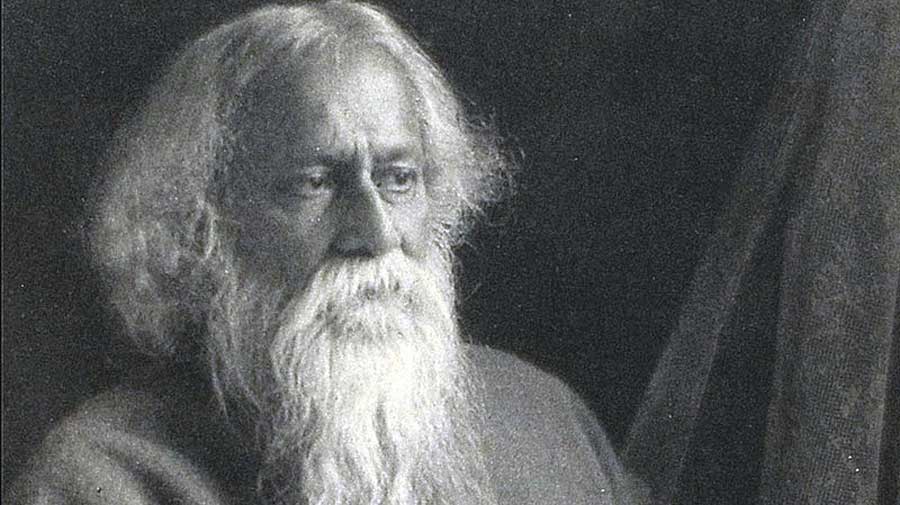Narendra Modi, Amit Shah and the Bharatiya Janata Party as a whole are known for conflating Hindutva with nationalism. Many BJP leaders, including Modi, have employed phrases, idioms and images invoking binaries — Eid versus Diwali, to cite one example — during election campaigns. These messages strengthen division and reflect the adoption of a sectarian approach for acquiring political power.
So when Modi and Shah invoked Rabindranath Tagore, one was reminded of the dire warning issued by Tagore in his speech, “Robbery of Soil”, delivered in 1922 at Calcutta University. Anticipating the “sectarian ambition for power”, Tagore outlined its sordid and grim aftermath endangering unity and amity among people and imperilling harmonious relations among the different organs of collective life. He said — presciently — “Whenever some sectarian ambition for power establishes a dominating position in life’s republic, the sense of unity, which can only be generated and maintained by a perfect rhythm of reciprocity between the parts is bound to be disturbed.”
The disunity and the imbalance attributed to the dominance of the “sectarian ambition for power” are now being replayed egregiously in the life of the Republic. Institutions are collapsing; freedom is being throttled; dissent criminalized. Tagore had prophesied that the “sectarian ambition for power” is accompanied by an assault on the unity of people and the subsequent fall of institutions, on account of greed, would threaten democracy. With a far-sighted perspective, he had said, “In a society where the greed of an individual or of a group is allowed to grow uncontrolled, and is encouraged or even applauded by the populace, democracy, as it is termed in the West, cannot be truly realized.” Tragically, some people are applauding the quest for power anchored in sectarianism. Tagore’s words and fears, articulated in 1922, have come true.
Gurudev’s incisive analysis — “In such an atmosphere a constant struggle goes on among individuals to capture public organizations for the satisfaction of their own personal ambition” — is applicable to the New India that is being conjured up by aligning it with the forces representing vigilantism and Hindutva. It is instructive that Tagore likened democracy prevailing in such a situation to an elephant employed by the clever and the rich for their benefit. This establishes the point that the proponents of sectarianism exercising the levers of power in a democracy reduce it to fulfil their pleasure-seeking activities.
Tagore reflected on another worrisome development. “The organs of information and expression, through which opinions are manufactured, and the machinery of administration, are openly or secretly manipulated by the prosperous few...” It is revealing that Tagore could anticipate rulers manufacturing narratives by determining the functioning of the media, thereby generating news and views as desired by them. Tagore was apprehending the emergence of what is now called ‘godi media’ that are subservient to the ruling regime. Tagore’s reflections on the domination of the media and the generation of media content by the rulers in their favour are evocative of Walter Lippmann’s articulations on the manufacturing of consent in his book, Public Opinion, published in 1922. It is remarkable that Tagore delivered his speech in which he elaborated on the same idea in the same year. These reflections are also echoed in Noam Chomsky’s Manufacturing Consent. It is also edifying to note that Tagore was sceptical that the people manipulating the organs of information and expression would, like the proverbial camel, never “... pass through the needle’s eye, that narrow gate, that leads to the kingdom of ideals”.
“Such a society”, Tagore said, “necessarily becomes inhospitable, suspicious, and callous towards those who preach their faith in ideals, in spiritual freedom”. Adding further, he said, “In such a society people become intoxicated by the constant stimulation of what they are told is progress, like the man for whom wine has a greater attraction than food”.
Nearly 90 years after Tagore wrote these lines, the people have been misled by progress or vikas and society has become “inhospitable, suspicious, and callous towards those who preach their faith in ideals, in spiritual freedom”. Indeed, it is tragic that those who are invoking Tagore are the same people who are persecuting citizens and Tagore’s vision of an India that is the embodiment of the ideal of a land “[w]here the mind is without fear and the head is held high”.
The author served as OSD to President K.R. Narayanan











